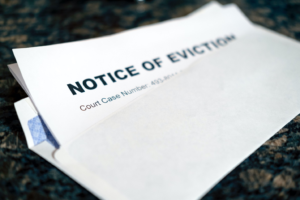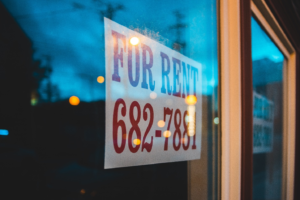Problem tenants are an inevitable and unpleasant part of every landlord’s life. While a robust screening system helps sift out potentially unsuitable applicants, sometimes troublemakers still find their way to a landlord’s property. For instance, someone who might seem reliable with a stable income at the time of screening can start paying rent late due to unforeseen circumstances that can hit at any time. Or maybe a despondent tenant suddenly decides that painting the walls neon yellow or getting a potbelly pig as a pet is the right therapy. And no screening solution can detect the chronic complainers who drive landlords insane with their never-ending demands!
While security deposits are not required by law, they generally help deal with such situations. A security deposit acts as an incentive for tenants to look after the property and provides a safety net to landlords in cases where the tenant fails to pay rent or damages the property. If you’re a landlord looking to rent out your property, here are some problem tenants you should steer clear of. If you’re already dealing with one or more of these problems, read on to find out expert-approved solutions for dealing with such cases.
#1 Partial-Paying Or Late Rent Payers
It’s best to make it clear in a friendly way that you don’t allow any leeway for late payments during the tenancy agreement signing. As a landlord, you can add a clause about late payment penalties and clarify that such actions will not be tolerated. Sometimes, even after hefty security deposits or continuous reminders, the tenants still make partial or late rent payments from time to time while others test the patience levels of their landlords with rent in arrears.
Impose a flat fee or a fixed percentage of the rental rate as a late fee penalty and indicate it clearly in the tenancy agreement. If the pattern continues, talk to the tenant to determine whether there’s a reasonable explanation for their behaviour. Alternatively, you can reach out to rent arrears solicitors at the Landlord Assists to issue a pay or quit notice to tell the tenants that they’ll need to move out of the property if they didn’t pay rent within the specified period or serve other notices that comply with the state’s law.
#2 Damaging DIY-ers
Unapproved improvements, property abuse or damage, and negligence are other common problems landlords face in the UK. In the old days, it was a norm to record all the issues caused by tenants in the rental unit on paper using a pen and a clipboard. Today, many landlords use inspection apps or take videos and pictures to maintain an archive of before and after pictures in an inspection report that can be used as evidence if a legal matter arises. If the tenant makes unsightly and unapproved upgrades, such as installing new shelves or fixtures or maybe just hammering in nails in various walls as opposed to the terms of the tenancy agreement, the landlord can ask the tenant to repair or repaint once the lease is up. Otherwise, they can withhold a certain percentage of their deposit to restore the damage and bring the unit to its original condition.
However, before deducting the amount from the security deposit, be sure that you’re aware of all the local and state laws on security deposits. It’s also crucial that you inspect the rental unit regularly to see if the damage being caused exceeds the regular wear and tear. Adding a clause to the lease stating that property abuse or unauthorised upgrades can lead to the termination of the tenancy agreement if the tenant doesn’t pay the repair cost or refuses to fix the damage. Landlords can also send a cure or quit notice if it’s added to the tenancy agreement beforehand.
#3 Illegal Subletting
Subletting all or part of the rental property isn’t illegal per se, but it’s a potentially lease-breaking activity if the landlord doesn’t allow it. Too many people have started renting out places they rent for short-term vacations using services like Airbnb. Some states have a law against this practice, but even if it’s legal in your area, and you don’t want multiple strangers using the property as short- or long-term roommates, you can get the clause added to the tenancy agreement that prevents unapproved subletting or unauthorised long-term guests.
#4 Lawbreakers
When a tenant signs the agreement, they agree to abide by the rules set by the landlord or risk eviction. From making landlords feel guilty about not allowing innocent pets in the rental units under the no pet policy to growing marijuana, getting drunk, selling narcotics, or engaging in any illegal, criminal, or violent activities in your property, there are lots of unbelievable things, tenants can do that puts the safety of your property and the entire neighbourhood at risk.
While thorough pre-screening helps avert such situations, it’s not impossible to still end up with tenants that are willing to break the laws. However, you should remember that even if the tenant gets arrested, their right to occupy the property remains intact; the lease doesn’t automatically become void. You’ll need to consult a reliable attorney to file an eviction.
Taking The Legal Route To Evict Tenants
Evicting a tenant can be a time-consuming and daunting process, especially if you’re handling the matters without any professional and legal help.
If you’re dealing with squatters or facing trouble removing your tenants, reach out to residential eviction specialists at Landlord Assist. Our team can guide you on legal ways to deal with tenancy issues.
Our eviction specialists and rent arrear experts are well-versed with the landlord and tenant laws followed across the UK. From drafting action letters to issuing a section 21 notice or sending a section 8 notice, possession claims, and instructing bailiffs, we can work through your predicament efficiently. We have a proven track record for success.
Connect with us by calling us at 08707 662288 or emailing at info@landlordassist.co.uk to learn more.










